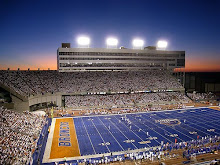It has always intrigued me how some schools have way more problems with athletes than other ones. But then again, maybe it is the same everywhere but because some colleges are bigger and "better" they just get more attention when somebody gets on the wrong side of the law. But then again, maybe it is what it seems. No smoke and mirrors. What do you think?
In college sports, recruiting is the number one endeavor that can make or break a program. This is obvious as the top football programs in the nation are consistently able to bring in those five-star players and incorporate them into their already stacked teams. How many top rated quarterbacks does one college squad need? At Texas, Oklahoma, USC, Ohio State, and other household, brand name colleges, the most likely answer is at least 3 or 4. The idea and obsessive occurrence of ranking these athletes proves the importance and attention that coaches and athletic directors put on recruiting. It is the same for fans. How many 5 and 4 stars did my school get on signing day? This seems to be the type of questions that fans ask themselves and discuss during the recruiting and signing period. Also, it explains the plethora of recruiting violations that exist in the NCAA, ranging from a minor violation of texting or calling a recruit a day before it is allowed, to a major violation of providing illegal or improper benefits to a coveted player. When a Michigan gets the top offensive lineman, it is just one example of the rich getting richer. However, every now and then, a smaller program is able to recruit a decent group of players. Then if they have good coaches, these athletes can develop and compete closely with the Florida’s and the LSU’s of the world. At times, these “lesser” schools can build on their own success until they have made themselves into bigger players in the college football world, garnering national attention and even beating some of these big names from time to time. This is exactly what has happened with schools such as Boise State, TCU, Utah, and even BYU, who won a pre-BCS national championship in 1984. Thus we see that in the last 5 years, at least one of these smaller schools has been in a BCS bowl game playing against the proverbial powerhouses, and in most cases winning. Boise State is the model school for turning lightly recruited cast-offs into All-American candidates and then beating the big schools in their own bowl games. For example; there has been Ryan Clady, Kyle Wilson, and currently Heisman-worthy Kellen Moore. All three of these athletes have played in one or both of the Fiesta Bowls in which the Broncos have found themselves. With this success the Broncos are now able to bring in bigger and more recruited athletes. It is a snowball effect of achievement that continues to build on itself. As mentioned, these schools, including Boise State, find themselves in the limelight, receiving a great deal of fame. They continue to reap the benefits of more and better recruits, and plenty of national exposure to boot. Like all things in life, there is a bad to the good, a dark to the light, an opposition. With national prowess and exposure come critical comments and a magnifying glass from the media, searching for any small or minute amount of wrongdoing. These small items often get blown out of proportion. It is also common to innocently bring in a couple of “thugs” or “bad apples” with the school’s recruiting classes. It is known that some, not all, of the best athletes have personal issues and/or behavioral problems. Exhibit A: The Miami Hurricanes of the 80’s and 90’s, the most famous being Michael Irvin and his well-publicized legal and personal issues. We also see Maurice Clarett from Ohio State and most recently, half of the University of Oregon football squad. Their struggles range from the Legarette Blount punch, to a line backer being kicked off the team, to even the star quarterback pleading guilty to burglary and being suspended for the entire season. Even more recently he has been dismissed ("dismissed" is a kind word meaning they got him out of there as fast as they possible could!) from the team for charges of marijuana posession, driving without a license, and a traffic violatioin. Sucks to be him. Even the Broncos are not immune to such difficulties. Jason Robinson, a back-up safety and special teams standout, was charged in with felony-aggravated battery for punching a Boise man at a bar and breaking his jaw in an incident that took place in March. He was promptly suspended from the team indefinitely. Robinson has later pleaded guilty to a misdemeanor battery charge and will spend time in the Ada County Sheriff’s labor detail. He will also pay restitution to the man whose jaw he broke. It may come as a surprise that this took place as the Broncos, for the most part, have avoided the negative spotlight. But just as history has shown us, sometimes the better athletes bring baggage, find themselves in unanticipated places, and end up doing things they never intended on doing. It is a sad facet to the grandeur and splendor that is college football. While Utah, TCU, Boise State, and BYU may never achieve the history and pageantry of Oklahoma or USC, they can at least compete with such programs on a game-to-game basis and on big stages. At the same time, they may never come under as much scrutiny when it comes to legal issues and personal problems for some of the players. But let’s not kid ourselves; no one is immune to the dark side of college athletics and recruiting.
Subscribe to:
Post Comments (Atom)









No comments:
Post a Comment